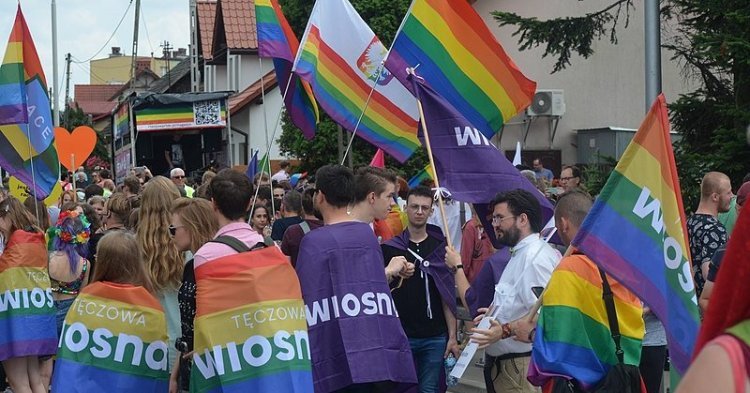The growing hostility can be traced back to a party which is currently the strongest in the Polish parliament: Prawo i Sprawiedliwość, in short, PiS. Translated into English, the name of the Party means Law and Justice. The irony in this name is quickly revealed when we consider the party’s habit of targeting minority groups. The newest minority group under attack: sexual minorities. PiS has been telling its voters for months that taking a supportive stance towards the LGTBQ community equals the opposition of traditional Polish values. According to the party and the Catholic Church in Poland, Poles are Catholic and God-loving, hetereosexual people with traditional marriages. Any differentiation is considered an abomination.
In accordance with this view, PiS wants to ban sex education for minors entirely. If this step were to become a reality in Polish schools, generations of children would grow up in with state-enforced ignorance towards sexual health and the issues people face when they discover their different sexual orientations and gender identities. This state-led ignorance is enabled by a political system that is increasingly chipping away its pillars of democracy. One these pillars is a strong judicial system that protects minorities from political despotism. In the Polish case, the European Commission stated in December 2017 that the judicial reforms taking place in Poland effectively signify that the country’s judiciary is under the political control of the ruling party.
But it is not only only the judicial system that is under reconstruction. The media, friend and foe to all populist regimes, seems to be more and more influenced by the politics at work. In a recent example of PiS support, the newspaper Gazeta Polska distributed “LGBT-free zone” stickers, showing rainbow flags crossed out by an X. A Polish court later barred the newspaper from distributing these stickers. With the judiciary increasingly under political control, the question is how long the system will brace itself against the politics of the current government.
Although the fight against sexual minorities has caused a lot of outrage, both inside and outside of Poland, it has not been the first step the administration has taken against minority groups. Another minority group that has been blamed and shamed under the current administration are refugees. In 2015, in the middle of Europe’s refugee crisis, the current PiS leader Jarosław Kaczyński stated that Poland could not accept any refugees because they could bring diseases and parasites to Polish soil. The campaign against refugees is a clear “no” to the European Union’s plans for sharing refugees and immigrants between member states.
Looking at Europe, Poland is not the first player to blame and shame minority groups. Hungary, under Prime Minister Viktor Orbán, has experienced its own share of scapegoating minorities. Similar to the Polish case, actions that take scapegoating from words to the actual exclusion of minority groups have been enabled by a weakened judiciary and press. In a political manner that is comparable to that of US president Donald Trump and his followers, Orbán’s Fidesz party has not only demonized refugees as terrorists but also refused to accept even those fleeing from war. Much like in the case of the US, Fidesz has been attacking its very own minority groups, such as Hungary‘s Roma and Jewish population.
Only recently has a court decided that the segregation of Roma children in schools in Eastern Hungary was unlawful and has had to be monetarily compensated by the government. To this day, Hungary‘s administration refuses to pay compensation to the Roma children subjected to racist treatment. This decision has had far-reaching consequences. It has emboldened far-right groups in their racist, fascist and homophobic ideas and it has enabled them to act accordingly.
This emboldening is reflected, for example, in the assault on a Jewish community center in Budapest in October 2019. The assault was carried out by the ultranationalist Legio Hungaria group, who tore down and burnt a rainbow flag and covered the building with neo-fascist slogans. The incident has been the latest in a series of far-right attacks against the community center, which is not only home to Jewish youth, but also members of the LGTBQ community, Roma and refugees.
Attacking otherness is a symptom of societies that are shaped by nationalistic, fear-mongering rhetoric. “We are better than others” is the demagogue’s response to the fear of losing out to other groups included in the plurality of democracy. With fear and scapegoating, the demagogue misses the beauty that is manifested in otherness, and the contribution each and every individual makes that forges a feeling of togetherness, rather than the feeling of isolation. It is a feeling that the European Union can foster and it is the challenge the European Union has to meet head on, despite opposing forces.
The European Union has been surprisingly reluctant to speak out and act on many of these issues. In the case of Polish law professor Jakob Urbanik, it still has the opportunity to act. After exhausting all legal possibilities in his homeland Poland, Urbanik is appealing to the European Court of Human Rights. In the face of adversary, there is still hope for the victory of diversity.

Follow the comments: |
|
